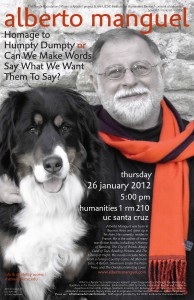Events

- This event has passed.
“What is a Reader?” Day of Events
January 26, 2012 @ 10:30 am - 6:00 pm |

What is a Reader? is a multi-campus project supported by the Teagle Foundation’s Big Questions in the Disciplines initiative. Established in 2009 by faculty members in English and Literature departments from Mills College, Stanford University, UC Berkeley, and UC Santa Cruz, the group seeks to understand undergraduate literacy today in historical perspective and its implications for the study of literature at the college level. Please see: whatisareader.stanford.edu.
Our special event will be a public lecture by book historian, novelist, and essayist Alberto Manguel at 5 PM in Humanities 1, Room 210. See poster for details. In addition, faculty, staff, and graduate students are warmly invited to two events earlier the same day.
10:30-12:30 UCSC MCHENRY LIBRARY SPECIAL COLLECTIONS. TWO LECTURES.
Elisabeth Remak-Honnef, McHenry Library Special Collections
“Ten Weeks with Medieval Books in McHenry Library”
Elisabeth Remak-Honnef is the Rare Books Librarian and bibliographer for Art History, Art and Classics at McHenry Library. Before coming to UC Santa Cruz in 1995, she worked for many years at the Bayerische Staatsbibliothek cataloging medieval Latin manuscripts. She received her advanced degrees from the University of North Carolina (PhD Comparative Literature) and the Ecole nationale des Chartes in Paris (archiviste-paléographe).
Since 2001, she has regularly taught an upper-division class on the history of the medieval book for the Art History and History departments at UC Santa Cruz. The course provides a survey of the evolution of book production and use in medieval Europe. Concentrating primarily on the relationship between text and image in medieval illuminated manuscripts in the art history class and on the power of writing and book collections in the history class, students examine how and for whom books were made, how they were decorated and used, and how they have survived. This talk will explore how students read and think about reading after an introduction to codicology.
Heidi Brayman Hackell, University of California, Riverside Department of English
“Early Modern Scenes of Reading”
Where did early moderns read? What objects conjured up a scene of reading in early modern drama and prose fiction? This talk will explore the materials that ornamented scenes of reading, the tools readers used, and the primary objects of readerly attention – books, broadsides, letters, inscriptions, images – in order to interrogate the category of the “reader” in early modern England.
Heidi Brayman Hackel is Associate Professor of English at the University of California, Riverside. She is the author of Reading Material in Early Modern England: Print, Gender, and Literacy (2005) and co-editor of Reading Women: Literacy, Authorship, and Culture in the Atlantic World, 1500-1800 (2008) and Teaching Early Modern English Literature from the Archives (forthcoming 2012). Her current book project is titled “Dumb Eloquence: Deafness, Muteness, and Gesture in Early Modern England.”
1:30-3:30 UCSC MCHENRY LIBRARY, SECOND FLOOR. WORKSHOP DISCUSSION OF ESSAYS.
The Teagle Workshop group will be discussing a suite of articles related to the topic of our event, “Spaces of Reading, Objects of Reading.” These readings follow upon those we shared at previous Teagle Workshops, which may be found listed on our group’s Website: whatisareader.stanford.edu
Brayman Hackel, Heidi. “Reading Women.” The History of British Women’s Writing, 1500-1610 (Vol. 2). New York: Palgrave Macmillan, 2010. 17-33.
This article addresses the challenges of discerning women as readers in the sixteenth century, examining multiple forms of historical evidence of women’s literacy such as diaries and memoirs while carefully distinguishing different reading practices. Evidence of gendered differences in literacy belies any simple assertion that most women were illiterate and therefore not reading.
Grafton, Anthony. “Apocalypse in the stacks? The research library in the age of Google.” Daedalus (Winter 2009): 87-98
This article provides an overview of the logistics of traditional print vs. newer online repositories in libraries, weighing the costs and benefits of both models. Grafton explains that online media are not replacing print media, but that both are proliferating at once, putting dual pressures on university libraries. He explores the changes the Internet has brought to research and reading practices as well as to libraries.
Manguel, Alberto. “The Library as Power.” The Library at Night. Toronto: Alfred A. Knopf, 2006. 91-104.
This chapter explores the totemic power granted books and the power of libraries as monuments and memorials founded by public figures. Though built to consolidate power, ironically, public libraries such as the Carnegie Libraries had the effect of empowering the public that used them.
Poblete, Juan. “Reading as a Historical Practice in Latin America: The first Colonial Period to the Nineteenth Century.” The Literary Cultures of Latin America: A Comparative History (Vol. 1: Configurations of Literary Culture). Oxford: Oxford University Press, 2004. Eds. Mario J. Valdes and Djelal Kadir. 178-192.
This article argues for an understanding of the social, collective production of meaning in the interpretation of texts, rather than a decontextualized discourse analysis. This understanding of the location of reading practices is applied to pre-colonial and colonial situations in the reception and understanding of texts in Latin America. The essay offer suggestive points of departure for discussion of the formation of communities of readers in the new media of today.
Interested faculty, staff, and graduates students are welcome to join us. For pdf copies of these readings, contact Laurel Peacock.
